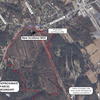Public can weigh in on Voorheesville overhaul
— From Business for Good submittal to village of Voorheesville
After residents raised concerns last month, Business for Good’s traffic engineer Alanna Moran told attendees at this month’s Voorheesville Planning Commission meeting that she had discussed with Albany County changing the two-way stop at the South Main Street, Center Street, Voorheesville Avenue intersection to an always-stop control.
VOORHEESVILLE — The village planning commission has set a June 7 public hearing at the Voorheesville firehouse on Business for Good’s proposal to overhaul large parts of downtown Voorheesville.
On June 7, the not-for-profit will propose demolishing buildings at 40 and 43 South Main St — it already took down the old Stewart’s at 42 South Main Street — and replacing them with a tavern, café, and parking lot.
Stephanie Marotta-Johnson of Business for Good said proposed hours of operation are 8 a.m. to 3 p.m., seven days a week, for the bike café, and noon to 11 p.m., for the tavern.
Chairman Steve Reilly told Marotta-Johnson she should expect some pushback at the public hearing on the tavern’s closing time.
During the commission’s March meeting, a resident who lived near the intersection of Center Street, Main Street, and Voorheesville Avenue raised concern with the project’s impact on traffic and safety.
At this month’s meeting, Business for Good’s traffic engineer Alanna Moran addressed the issue.
Moran said she needs to work with Albany County on the implementation, but said one thing that was discussed was changing the two-way stop at the South Main Street, Center Street, Voorheesville Avenue intersection to an always-stop control. “With that, there’d be stop bars on each of the approaches, there’d be the all-way plaque. And so, everybody approaching the intersection would need to stop and then continue on,” she said.
Reilly asked Moran if her traffic analysis also looked at other times when the tavern is likely to be busy, like weekends and between 6 p.m. and 9 p.m.
She answered, “So when we do a traffic evaluation, we really focus in on the peak hour of the adjacent street traffic; typically, that’s the weekdays during the morning peak period from 7 to 9 a.m., and then during the afternoon peak period from 4 to 6 p.m.”
The report submitted to the commission said the tavern would generate 26 new trips during the p.m. peak hour, while it’s not expected to generate any new trips during the morning hours. The bike café is expected to generate 16 new trips during the a.m. peak hour, and nine trips during the p.m. peak hour.
Moran said the best correlation for post-6 p.m. traffic would be p.m. peak hour traffic generation, and Saturday traffic would be mid-day.
Reilly said he asked about the off-hours analysis because there are evenings that Old Songs, at 37 South Main St., puts on concerts that between 90 and 100 people attend.
“It’s not every night, right? Sometimes it’s not every week. But sometimes you’ll get two or three in close proximity…,” he said.
Reilly asked if Old Songs were taken into account, would that change the study results in any way.
He was told it wouldn’t, but then Moran corrected herself and said, “Folks will notice when there’s a new restaurant here … But there are not enough trips associated with it for it to be an actual [State Environmental Quality Review] impact.”
Reilly asked Marotta-Johnson if she’d reached out to other businesses along Main Street about shared parking arrangements, which is something the commission has been recommending for months.
Marotta-Johnson had reached out to Old Songs, and made it clear with the rest of her answer that it was the only organization she’d contacted. The project is requesting a waiver for 46 parking spaces.
Project architect Brett Balzer asked Reilly, “Are you looking for our team to create the shared parking arrangements?”
Reilly wasn’t looking for Business for Good to check a box, he said, “I’m suggesting that it’s maybe neighborly to start having some of those conversations. Because if we don’t and it starts to affect everybody’s parking … We want it to work.”
Mayor Rich Straut said, “The village board sees [parking] as partly our responsibility, as a greater issue to be able to support the revitalization of Main Street. That is a village issue more so than the individual issue for Business for Good.”


